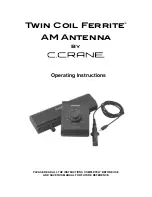
DAP25
•
14
2. Install inductor L1, 33 nH [white chip]. Use caution as not to fill the “P1”
hole with solder when installing this component.
3. Install capacitor C2, .001 uF [gray chip].
4. Identify the low noise preamplifier IC (four solder tabs marked with a
“5”). After noting carefully the correct orientation, install in the U1 position,
soldering all four tabs.
5. Install C1, the other .001 uF capacitor [gray chip]. Use caution as not to
fill the “P2” hole with solder when performing this installation.
6. Install diode D1 (marked 7X), noting its orientation and installing in the
proper direction.
7. Now we’ll prepare the coaxial cable for installation to the circuit board.
We need to “break out” the two wire components of the cable. Trim about
1” of the outer insulation from the cable, being careful not to cut through
the outer braid of wire. Using a fine pointed tool, carefully “un-braid” about
3/4” of the outer conductor and fan out the loose strands of wire. Once this
is accomplished, trim back about 1/2” of the center insulation. Be careful
not to cut through the center conductor. You will want to trim about 3/4” off
of the exposed braid to aid with further installation. Carefully “tin” the cen-
ter conductor of the cable by adding a small amount of solder to the
twisted center conductor of the coaxial cable. Use care not to leave the
soldering iron in contact with the wire for too long as it can melt the center
insulation and short-out the cable. Tinning allows us easy installation of
the coaxial cable to the circuit board assembly and minimizes the chance
of overheating the wire when this installation occurs. Be careful that no
stray wires tend to short together, if they are too close together carefully
trim them away. Have a look at the diagram to see what the complete
“pre-assembled” cable should look like.
Braid
Coaxial Cable
Center Insulation
Center Conductor
1/2 inch
1 inch






































